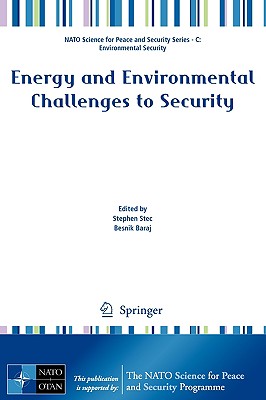On 21 November 2007 the grand and elegant Delegates Hall of the Hungarian Parliament was the scene of the opening of a conference to discuss some of the most pressing issues of the day, those related to our unending thirst for energy, its environmental consequences, and the challenges that these bear on security. Over the next 3 days scientists, parliamentarians and their guests confronted, challenged, teased and cajoled each other in a NATO Advanced Research Workshop (ARW) entitled "Energy and Environmental Challenges to Security," affirming that knowledge and public service hold the keys to solving our greatest challenges. The magnitude of the security challenge was confirmed while this volume was being prepared. In mid-2008, the International Energy Agency issued a report concluding that US$45 trillion would be needed over the next half century to prevent energy shortages and greenhouse gas emissions from undermining global economic growth. But lest such large numbers cause us all to shrug, this volume brings attention to some of the more manageable aspects of the environment and energy security challenge - from addressing conflict resources such as illegal timber that contribute to corruption and regional instability, to means and mechanisms to enable the diversification of energy supplies, to environmental risk reduction strategies for particular installations. The participants in the Hungarian Parliament building were atypical for a NATO Advanced Research Workshop.
| FindBook |
有 1 項符合
Energy and Environmental Challenges to Security的圖書 |
 |
Energy and Environmental Challenges to Security 作者:Stec 出版社:Springer 出版日期:2009-01-29 語言:英文 規格:精裝 / 455頁 / 23.4 x 15.5 x 2.8 cm / 普通級 |
| 圖書館借閱 |
| 國家圖書館 | 全國圖書書目資訊網 | 國立公共資訊圖書館 | 電子書服務平台 | MetaCat 跨館整合查詢 |
| 臺北市立圖書館 | 新北市立圖書館 | 基隆市公共圖書館 | 桃園市立圖書館 | 新竹縣公共圖書館 |
| 苗栗縣立圖書館 | 臺中市立圖書館 | 彰化縣公共圖書館 | 南投縣文化局 | 雲林縣公共圖書館 |
| 嘉義縣圖書館 | 臺南市立圖書館 | 高雄市立圖書館 | 屏東縣公共圖書館 | 宜蘭縣公共圖書館 |
| 花蓮縣文化局 | 臺東縣文化處 |
|
|
圖書介紹 - 資料來源:博客來 評分:
圖書名稱:Energy and Environmental Challenges to Security
|









